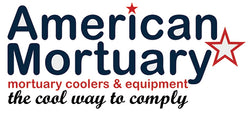The Real Cost of Water Cremation in 2024
The cost of water cremation ranges from $995 to $5,095 across the United States, with most facilities charging between $1,500 and $3,200. The national average price is approximately $2,500.
| State | Average Cost | Compared to Traditional Cremation |
|---|---|---|
| Missouri & Washington | Under $1,000 (lowest) | 35-50% more |
| California & Vermont | $3,500-$4,600 (highest) | 75-100% more |
| National Average | $2,500 | 35-100% more expensive |
Water cremation, also known as aquamation or alkaline hydrolysis, is gaining popularity as an environmentally conscious alternative to traditional flame cremation. If you're considering this option for yourself or a loved one, understanding the costs involved is essential for making an informed decision.
Unlike traditional cremation that uses fire, water cremation uses a gentle water-based process that accelerates natural decomposition. This process is not only more environmentally friendly but also returns about 20-30% more remains to families.
So why does water cremation typically cost more than traditional cremation? The higher price reflects several factors: expensive equipment investment (systems cost $180,000-$270,000 to install), limited availability in many states, and relatively low demand that hasn't yet created price competition.
The cheapest states for aquamation services are Missouri and Washington, where costs can be as low as $995. On the other end of the spectrum, California and Vermont tend to be the most expensive, with services reaching up to $4,600.
For funeral directors looking to add this service, understanding these cost dynamics is crucial both for business planning and for transparently communicating options to families seeking greener alternatives.
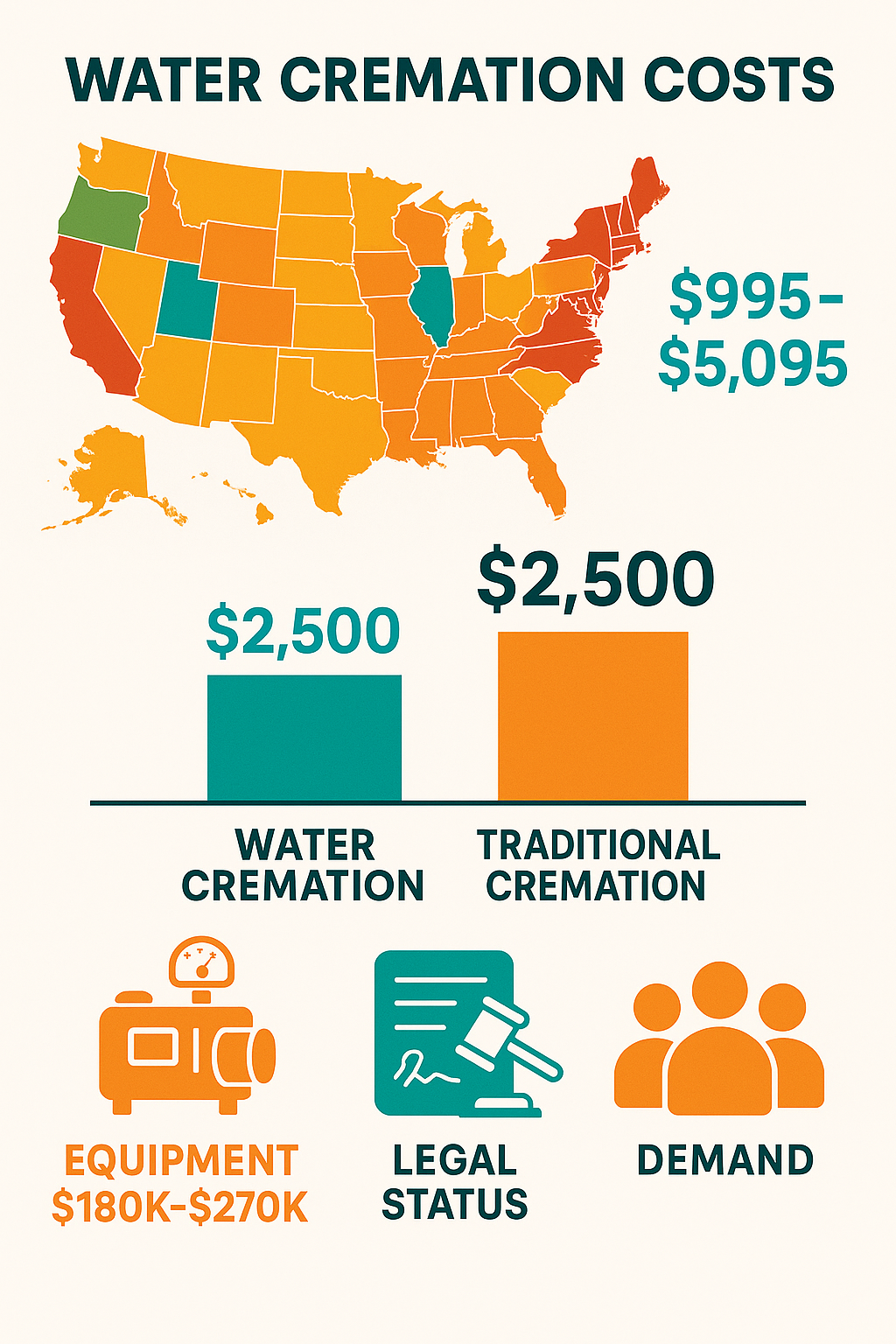
Understanding Water Cremation
Water cremation offers a gentle, dignified alternative to traditional flame-based methods for handling our loved ones after they've passed. Known scientifically as alkaline hydrolysis and commonly called aquamation, this approach represents a meaningful shift in how we think about end-of-life care.
At its heart, water cremation simply accelerates the natural process that would occur if a body were laid to rest in the earth. What would take decades in soil happens in just hours through this remarkable process. It's nature's way, just faster.
As one family member beautifully put it: "The most profound comment I read that put it quite succinctly was to compare the notion of whether 'putting grannie in a warm bath or a hot fire' seems the best concept!" This lighthearted but thoughtful observation captures why so many families are drawn to water cremation as a gentler option.
This isn't new technology – it was initially developed for the farming industry as a natural way to handle animal remains. Medical institutions later recognized its value, researching and supporting the method until it evolved into the respectful disposition option we have today. Now, it's recognized by organizations like the UK Cremation Society as a legitimate and compassionate choice.
How Does Water Cremation Work?
The cost of water cremation often reflects its sophisticated yet straightforward process. When a family chooses this option, their loved one is placed in a clean, stainless steel vessel – similar to a specialized bath. The chamber is filled with a mixture that's 95% water and just 5% alkali (typically potassium hydroxide or sodium hydroxide).
Unlike flame cremation's intense 1,800°F heat, water cremation uses a much gentler temperature between 320°F and 350°F. The combination of warm water flow, moderate heat, and pressure works together to accelerate the natural tissue breakdown process.
After about 3-8 hours (slightly longer than flame cremation's 2-3 hours), the body gently returns to its basic elements. All that remains are bone minerals, which are processed into a fine, white powder similar to what families receive after traditional cremation. Interestingly, water cremation actually returns 20-30% more remains to families, requiring a slightly larger urn.
"They're placed into a chamber that uses water, heat and agitation in order to create pressurization and it basically just accelerates the natural decomposition process," explains one funeral home representative. The resulting liquid is environmentally beneficial and can be returned to the ecosystem as a nutrient-rich solution.
One practical advantage families appreciate: unlike flame cremation, water cremation doesn't require removing pacemakers or other medical implants beforehand. These devices remain intact throughout the process and can be recycled afterward – a safer and more environmentally responsible approach.
For many families weighing the cost of water cremation against traditional options, this gentle, water-based method offers peace of mind. It honors their loved one with dignity while reflecting values of environmental stewardship that may have been important to the deceased.
The Cost of Water Cremation
When families explore end-of-life options, understanding the cost of water cremation often becomes a crucial part of their decision-making process. Like many funeral services, the price varies considerably depending on where you live, who provides the service, and what exactly is included in your package.
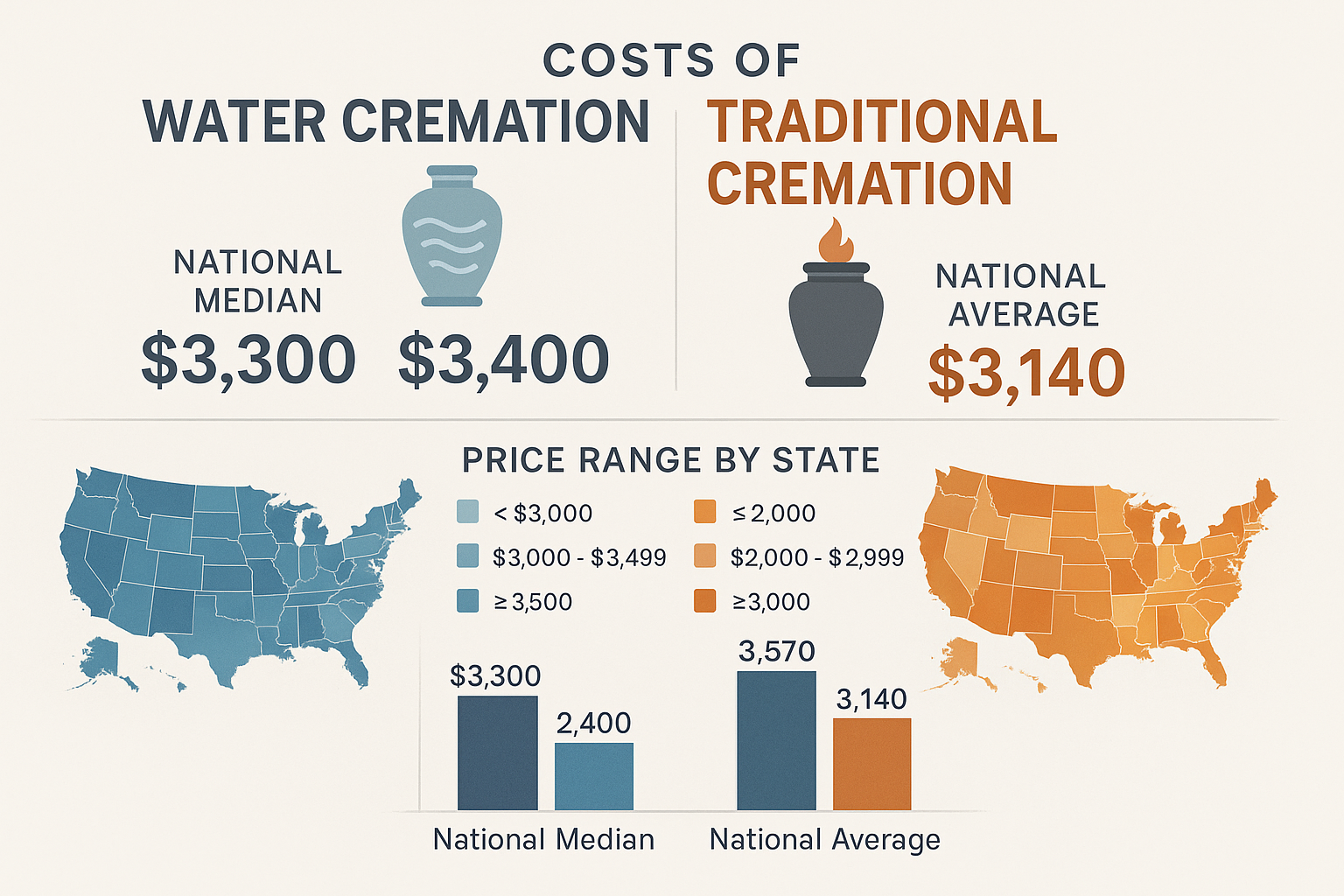
Looking at the numbers nationwide, water cremation (or aquamation) typically costs around $2,593 on average, with the median price sitting at $2,371. But these figures only scratch the surface of the story. Across America, what families actually pay ranges dramatically from as little as $995 to as much as $5,095 – quite the spread!
Most standard water cremation packages include the essentials: transportation of your loved one, the actual aquamation process itself, all required paperwork and permits, and the return of remains in a simple container. Just like with traditional services, if you're looking for additional options like viewings, memorial services, or specialty urns, those will add to your final cost.
Average Cost of Water Cremation Across Different States
The price tag attached to water cremation varies tremendously depending on which state you call home. This geographic variation creates an interesting patchwork of affordability across the country.
If you're looking for the most budget-friendly options, Missouri and Washington lead the pack, with services starting around $995. Most families in these states pay around $1,395 to $1,700 – significantly below the national average.
The middle of the road states include places like Minnesota, where prices typically range from $1,795 to $3,390, with most families paying around $2,500. Illinois offers somewhat more affordable options, with prices between $1,500 and $2,700, and a median cost of $1,895. In Maine and Oregon, expect to pay between $2,000 and $3,000, with average costs hovering around $2,500 and $2,300 respectively.
On the higher end of the spectrum, California residents face steeper costs, typically between $3,597 and $3,950. Vermont currently holds the distinction of being the most expensive state for water cremation, with a median price of $4,616 – nearly double the national average. Colorado also falls into the premium category, with prices ranging from $3,000 to $3,600.
These variations don't happen by accident – they reflect each state's unique market conditions, operational expenses, and how many providers are competing for business. In states where aquamation has just been legalized or where only one or two facilities offer the service, prices tend to run higher due to limited competition.
Factors Contributing to the Cost of Water Cremation
Why does water cremation typically cost more than traditional flame cremation? Several key factors drive this price difference:
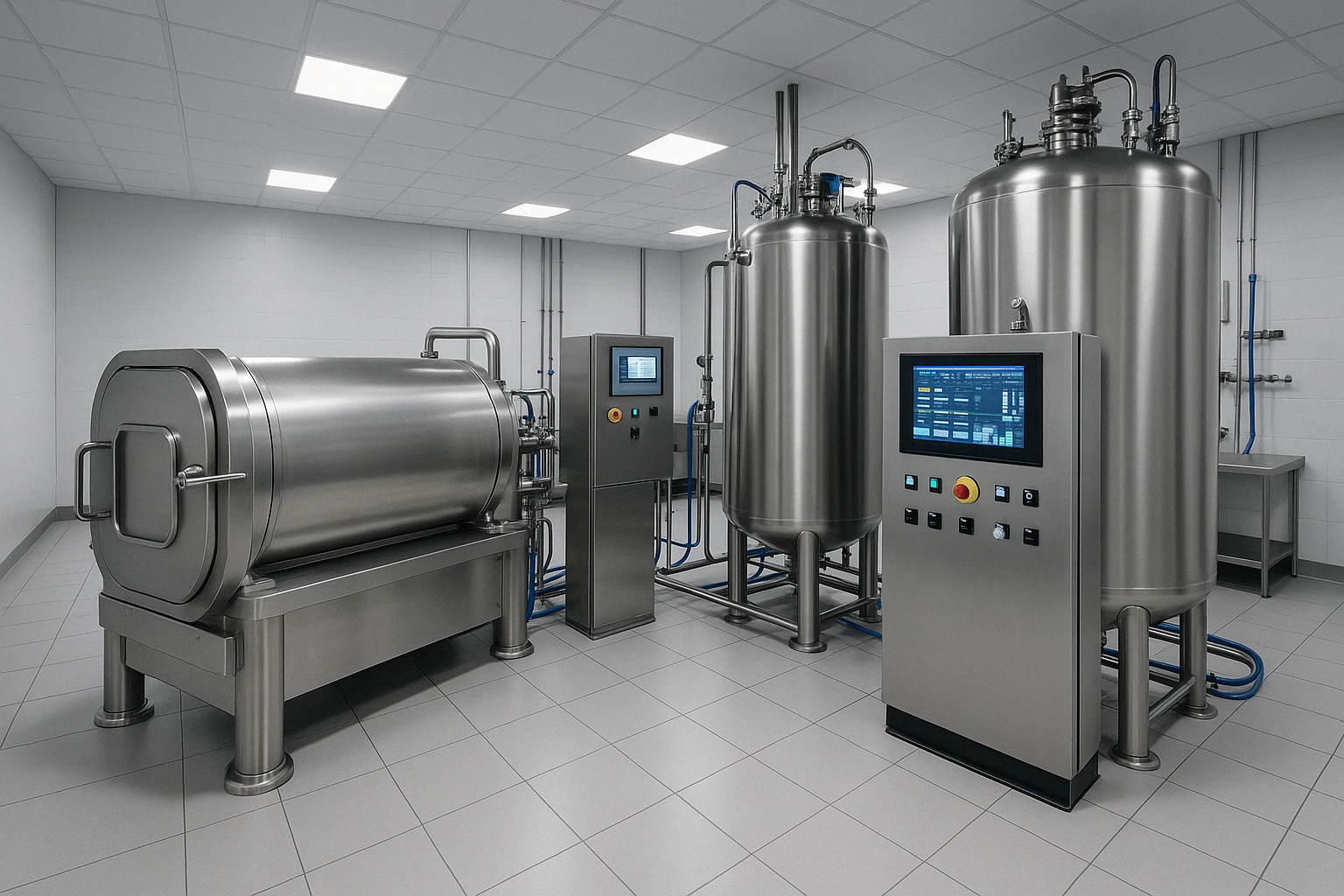
High Equipment Investment stands as perhaps the biggest factor. The specialized equipment required for aquamation represents a substantial upfront investment for funeral homes – between $180,000 and $270,000 for a complete system installation. Compare this to traditional cremation equipment at around $130,000 installed, and you can see why providers need to charge more to recoup their investment.
Limited Availability also plays a significant role in pricing. While aquamation is legally permitted in 28 states, operational facilities exist in only 17 states. This means many providers must transport remains to partner facilities, adding transportation costs to the final bill.
The Low Volume Business aspect can't be overlooked either. As a newer service with growing but still limited demand, fixed costs get spread across fewer customers, naturally driving up the per-service price. It's simple economics – the fewer people choose a service, the more each person pays to cover the basic costs of offering it.
Operational Expenses for water cremation include specialized staff training, regular equipment maintenance, and utilities (particularly water and electricity). These ongoing costs contribute to the overall price structure.
Finally, Market Positioning influences how some providers price their services. Many position aquamation as a premium, eco-friendly alternative – a positioning strategy that often comes with higher price points.
As one of our partner funeral directors recently shared with us: "We pride ourselves on affordability and leveraging technology to offset the average cost of cremation, but the initial investment in aquamation equipment is substantial and must be factored into our pricing."
At American Mortuary Coolers, we understand these cost dynamics intimately. We work with funeral homes across our regional centers in the Southeast, Southwest, Midwest, Northeast, Rocky Mountain, and Pacific regions to provide the equipment and expertise needed to offer this service efficiently and affordably. By helping funeral homes manage their equipment costs effectively, we play a small part in making this eco-friendly option more accessible to families across America.
Comparing Water Cremation to Traditional Cremation and Burial
When families face end-of-life decisions, understanding the financial implications of different options becomes crucial. The cost of water cremation should be evaluated alongside traditional methods to make an informed choice that respects both budget constraints and personal values.
| Service Type | National Average Cost | Environmental Impact | Process Duration |
|---|---|---|---|
| Water Cremation | $2,500 ($995-$5,095) | Minimal - 90% less energy, no emissions | 3-8 hours |
| Traditional Cremation | $1,600 ($1,000-$3,000) | Moderate - fossil fuel use, emissions | 2-3 hours |
| Traditional Burial | $7,848 ($6,000-$12,000+) | Significant - land use, embalming chemicals | Permanent |
Looking at your options, traditional flame cremation is generally lighter on the wallet. With costs between $1,000 and $3,000 (national average around $1,600 for direct cremation), it's typically 35% to 100% less expensive than water cremation depending on where you live.
The real eye-opener comes when comparing either cremation method to traditional burial. A standard funeral with burial averages $7,848 - and that's before adding a cemetery plot, headstone, or vault. You're looking at potentially three times the cost of water cremation. As one funeral director put it to me recently, "When families see these numbers side by side, they often reconsider what 'traditional' means to them."
Both cremation options include similar basics in their base price: transportation of your loved one, the cremation process itself, necessary permits and paperwork, and return of remains in a simple container. Anything extra - like viewings, memorial services, special urns, or scattering ceremonies - will add to your final bill regardless of which option you choose.
"Water cremation uses 90% less energy than fire cremation and it's more cost effective [than traditional burial]," noted one funeral home representative. This sweet spot between environmental consciousness and moderate cost has made aquamation increasingly attractive to families who find traditional burial too expensive but still want to make an eco-friendly choice.
Why Is Water Cremation More Expensive in Some States?
The cost of water cremation varies dramatically across the country for several understandable reasons.
In states with fresh regulations, compliance costs can push prices upward. California, with its strict environmental standards, sees some of the highest prices despite being environmentally progressive. Vermont tops the charts at $4,616, largely due to limited facilities and lack of competition.
Geography plays a surprising role too. If you live in a state where aquamation is legal but facilities are scarce, your loved one may need to be transported across state lines, adding significant costs to the final bill. As one provider explained to me, "Sometimes we're driving three hours each way to the nearest facility - that time and fuel has to be factored in."
Regional economics naturally influence pricing as well. States with higher living costs see that reflected in funeral service pricing across the board. Meanwhile, in places like Missouri and Washington where aquamation has been around longer, increased competition has driven prices down to as low as $995.
"The way we're approaching this bill and the way it ought to be approached, do families have the option, do they have the freedom to choose?" noted one legislative advocate. This freedom of choice is directly impacted by these cost variations - when prices climb too high in certain regions, it effectively limits access to this option for many families.
At American Mortuary Coolers, we've watched these regional differences unfold through our partnerships with funeral homes across our locations in Johnson City TN, Atlanta GA, Chicago IL, Columbia SC, Dallas TX, Los Angeles, New York NY, and Pittsburgh PA. Our experience shows an encouraging trend: as more facilities adopt water cremation technology in a region, prices generally become more competitive, making this choice more accessible to the average family.
Environmental Benefits of Water Cremation
Beyond cost considerations, many families choose water cremation primarily for its significant environmental advantages. The cost of water cremation may be higher than traditional cremation in most states, but the ecological benefits often justify this premium for environmentally conscious individuals.
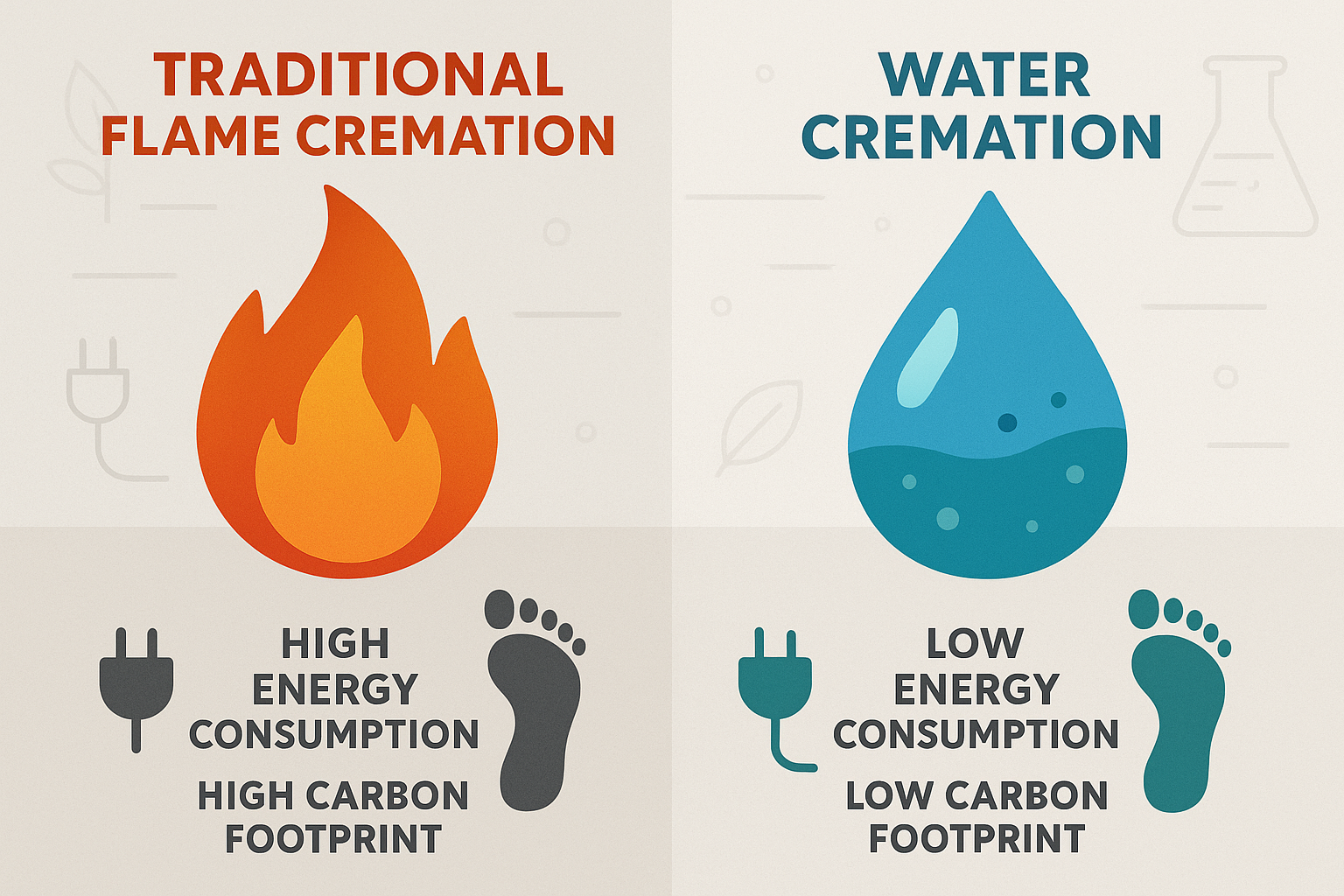
When families sit down to discuss final arrangements, the conversation increasingly includes environmental impact alongside financial considerations. Water cremation stands out as a remarkably gentle option for our planet.
The process uses approximately 90% less energy than flame-based cremation - a dramatic difference when you consider that traditional cremation requires heating to temperatures around 1,800°F, while water cremation operates at just 320-350°F. This energy efficiency translates directly into a much smaller carbon footprint, with water cremation producing roughly one-tenth the carbon emissions of traditional methods.
"There is over a 90% energy savings when compared to flame-based cremation," explains one provider we work with at American Mortuary Coolers. "Many families tell us they're willing to pay a bit more for that peace of mind."
Another significant benefit comes from how water cremation handles mercury and medical implants. With traditional cremation, dental fillings containing mercury vaporize and release harmful emissions into the atmosphere. Pacemakers must be removed to prevent explosion, and other implants are incinerated at high temperatures. Water cremation, however, leaves these intact, allowing for proper recycling of metals and preventing potentially harmful emissions.
Green Advantages Over Traditional Cremation
The gentle nature of water cremation extends to its water usage as well. Despite being water-based, most modern systems are remarkably efficient, recycling 95-98% of the water used in the process. The remaining liquid is completely sterile, containing no DNA or RNA, and can be safely processed through normal wastewater treatment facilities.
"It's basically just a sterile solution of amino acids, peptides, sugars and salts," one provider notes. This solution often becomes bio-nutrient fertilizer after treatment – returning beneficial compounds to the earth rather than releasing emissions into the air.
For many families we work with across our regional centers – from Tennessee to California – this aspect of water cremation feels deeply meaningful. There's something poetic about a process that helps nourish new life, rather than simply ending it.
The higher initial cost of water cremation is often viewed as an investment in environmental stewardship. Just as someone might have chosen organic foods or renewable energy during life, water cremation offers consistency with eco-friendly values in death. We've seen this reasoning resonate particularly strongly with families of environmentally conscious individuals.
"My mother was passionate about protecting the earth her entire life," shared one client at our Chicago facility. "Choosing water cremation for her felt like honoring that commitment one last time, regardless of the slightly higher cost."
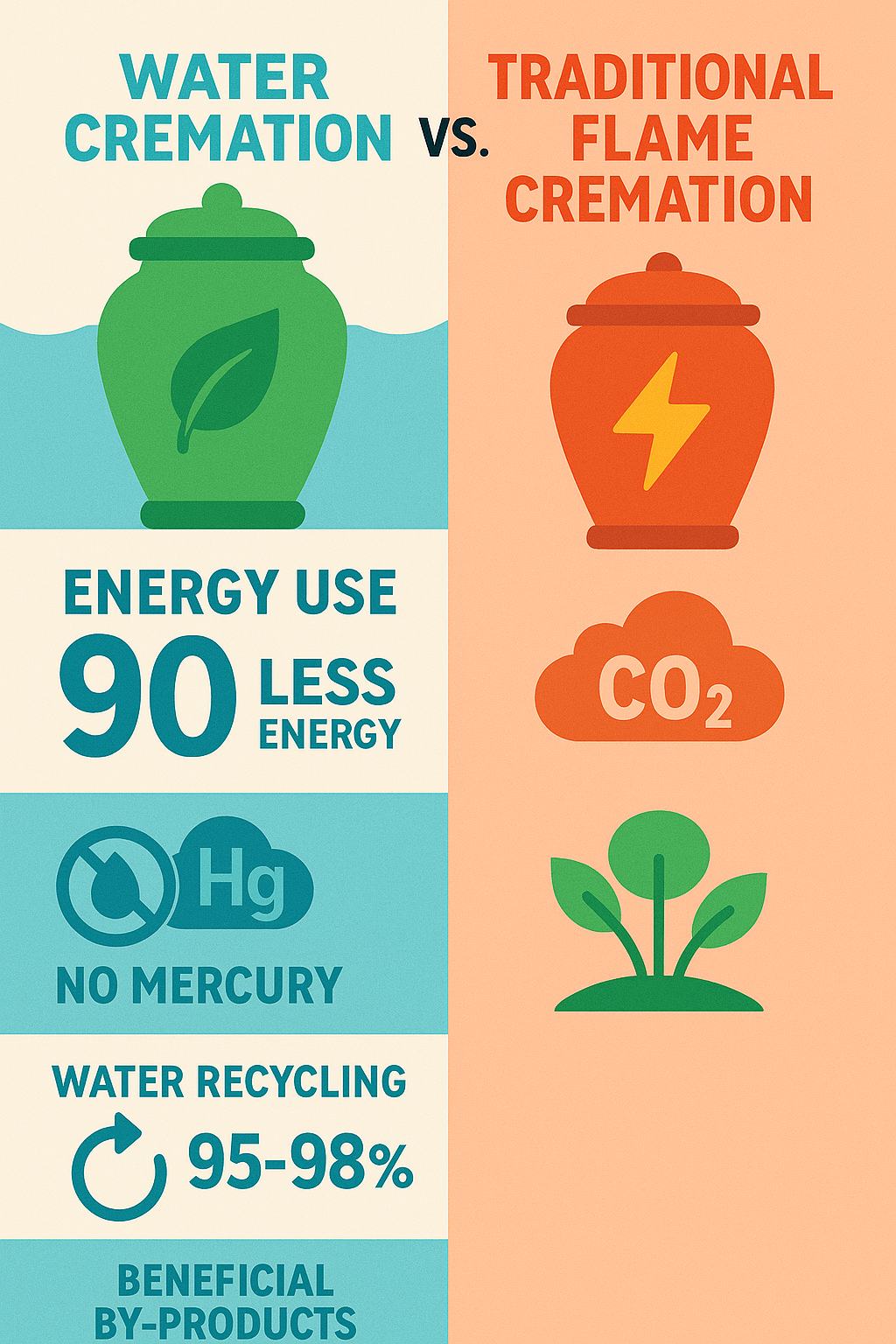
At American Mortuary Coolers, we've watched interest in water cremation grow steadily across all our regions as environmental awareness increases. Families making end-of-life arrangements increasingly tell us they're willing to absorb the higher cost of water cremation to minimize their final environmental impact – a trend we expect will only continue as more people learn about this gentle alternative.
Legal Considerations and Availability
If you're considering water cremation for yourself or a loved one, understanding where it's available and legal is just as important as knowing the cost of water cremation. The legal landscape across America looks a bit like a patchwork quilt - available in some places, still working its way through legislation in others.
As of 2024, water cremation (aquamation) is legally permitted in 28 states across the country. However, there's an interesting gap between legality and actual availability - while 28 states have given the green light, only 17 states actually have operational facilities offering the service. This disconnect creates both challenges and cost implications for families interested in this option.
The states where you can legally choose water cremation include Alabama, Arizona, California, Colorado, Connecticut, Florida, Georgia, Idaho, Illinois, Kansas, Maine, Maryland, Minnesota, Missouri, Nevada, New Hampshire, North Carolina, Ohio, Oregon, Texas, Utah, Vermont, Washington, and Wyoming. That's quite a diverse geographic spread, though notable gaps remain in the Midwest and parts of the Northeast.
But here's the reality many families face: just because something is legal doesn't mean it's readily available. As one funeral director in a newly approved state told us: "We received calls about aquamation immediately after the legislation passed, but it took us nearly eight months to get the equipment installed, trained on, and properly permitted." This gap between legalization and implementation often contributes to higher costs in states where the service is newly available.
Navigating Legal Challenges and Accessibility
Finding accessible water cremation services often requires some research and possibly flexibility regarding location. In many states, the cost of water cremation is directly influenced by its limited availability and the regulatory environment.
When a family contacts us at American Mortuary Coolers about water cremation options, we typically advise checking a few key factors. First, confirm whether your state has legalized the process. If you're in one of the 22 states where it's not yet legal, you might want to contact local advocacy groups working toward legislation - many states have bills pending that could change the legal status soon.
Even in states where aquamation is legal, finding a provider with operational equipment can be challenging. You might need to call several funeral homes, as many are still in the process of adding this service. As one funeral director explained to us, "We're waiting for the regulatory framework to catch up with the legislation before making the investment." This waiting period between legalization and widespread availability creates a supply-demand imbalance that affects pricing.
Transportation across state lines is sometimes necessary and adds complexity. When a family in Georgia wanted water cremation but no local provider offered it, they had to arrange transportation to a facility in Florida. This required additional permits and significantly increased the overall cost of their arrangements.
Religious considerations also play a role in both availability and acceptance. Some religious organizations have expressed concerns about water cremation. As one religious leader stated, "Chemical digestion of the human body fails to follow this simple principle." Families with strong religious affiliations should research their faith's position on this method before proceeding.
For funeral homes considering adding water cremation services, the regulatory landscape presents significant challenges. The equipment investment is substantial - approximately $135,000 installed - making it difficult to justify in states where demand remains uncertain or where regulations might change.
Currently, aquamation is legal in 28 states and actually available in 13, creating a significant gap between theoretical and practical access. This limited availability directly impacts the cost of water cremation, as providers in states with few facilities can charge premium prices due to lack of competition.
At American Mortuary Coolers, we've worked with funeral homes across our regional centers in the Southeast, Southwest, Midwest, Northeast, Rocky Mountain, and Pacific areas to steer these complexities. We've found that as regulations stabilize and more providers enter the market, the cost tends to become more competitive - good news for families seeking this environmentally friendly option.
Impact of Cost on Consumer Choices
The cost of water cremation plays a pivotal role in how families make their final arrangements, often creating a delicate balance between environmental values and financial realities. When families sit down to make these difficult decisions, money matters—but it's rarely the only consideration.
For many families, the conversation around water cremation starts with comparing prices. With aquamation typically costing 35-100% more than traditional flame cremation, this premium requires careful thought. As one provider explained to their clients, "Traditional funeral base price can cost upwards of $7,000, while water cremation may cost just under $1,900." While this makes water cremation more affordable than a traditional burial, the price difference compared to flame cremation can still be a hurdle for families on tight budgets.
Yet for environmentally conscious individuals, the higher cost of water cremation often represents more than just a price tag—it's an investment in their values. "Water cremation uses 90% less energy than fire cremation and it's more cost effective," noted one funeral home representative when discussing options with families. This perspective helps many people reconcile the additional expense with their desire to make environmentally responsible choices, even in death.
Practical considerations also influence these decisions. In states where aquamation facilities are limited, families may face additional transportation costs or logistical challenges that make the process less attractive despite its environmental benefits. A family in rural Vermont, for instance, might need to weigh their environmental values against the reality of limited local options and higher regional prices.
Cultural and religious backgrounds add another dimension to this decision-making process. Some families come from traditions that have specific preferences or restrictions regarding disposition methods, which can either increase or decrease their willingness to pay premium prices for water cremation.
What we're seeing at American Mortuary Coolers is that as awareness grows about water cremation, so does consumer interest—even with the higher price point. This suggests that many families find the environmental benefits worth the additional cost when their finances allow. Through our work with funeral homes across different regions, we've noticed that the conversation is shifting from "Is it worth the extra money?" to "How can we make this work within our budget?"
Pre-planning has emerged as a particularly effective strategy for managing the cost of water cremation. By making arrangements in advance, families gain the ability to compare prices from multiple providers, set aside specific funds, lock in current rates before potential increases, and reduce the financial burden on surviving family members during an already difficult time.
"Plan ahead if you reside in regions where water cremation is just becoming available or is being considered for legalization," advised one industry expert we work with. This forward-thinking approach allows families to incorporate their environmental values into end-of-life planning while still managing costs in a practical way.
In our experience working with funeral homes across our locations from Atlanta to Los Angeles, we've found that providers who offer transparent pricing and clearly explain the environmental benefits tend to see greater acceptance of the higher cost of water cremation. When consumers fully understand what they're paying for—both in terms of the service itself and its ecological advantages—they're often willing to choose water cremation despite the premium pricing.
The bottom line? While cost certainly influences consumer choices, it's just one part of a complex and personal decision. As water cremation becomes more widely available and understood, more families are finding ways to align their financial realities with their environmental values when making these important end-of-life choices.
Frequently Asked Questions about the Cost of Water Cremation
Is Water Cremation More Expensive Than Traditional Cremation?
Yes, the cost of water cremation does typically run higher than traditional flame cremation. Most families can expect to pay between $1,500 and $3,200 for water cremation, with the national average sitting at about $2,500. Traditional direct cremation, by comparison, costs around $1,600 on average nationwide.
The price difference isn't small - water cremation can cost anywhere from 35% to 100% more than flame cremation, depending on where you live. This higher price tag makes sense when you consider what's behind it. Funeral homes must invest in expensive aquamation equipment (often costing $180,000-$270,000), and since fewer people currently choose this option, those fixed costs get spread across fewer customers. Plus, with limited availability in many states, there's less competitive pricing to drive costs down.
That said, both water cremation and traditional cremation remain much more affordable than a traditional burial, which averages around $7,848 nationally - and that's before adding a cemetery plot, headstone, or vault.
How Can I Find Affordable Water Cremation Services?
Finding a reasonably priced water cremation takes a bit of homework, but the environmental benefits make it worth the effort for many families. Start by calling multiple providers in your area - you might be surprised by the price variations. In Missouri, for example, the same basic service can range from $995 to over $2,000 depending on which provider you choose.
If you live near a state border, don't limit your search to just your state. Sometimes traveling a short distance can save you hundreds of dollars. One consumer told us, "I found that by comparing quotes across providers in neighboring states, I achieved significant savings by negotiating fees."
Consider working directly with facilities that own their equipment rather than those that outsource to third parties. These direct providers often offer better pricing since they're not adding markup for a middleman. And always make sure you're comparing apples to apples - some lower-priced options might exclude transportation or other essential services.
Many families have found success with pre-planning and pre-paying for water cremation. Not only does this often come with a discount, but it also locks in current rates before any future price increases. It's also a thoughtful way to spare your loved ones from making financial decisions during a difficult time.
Are There Ways to Reduce the Cost of Water Cremation?
Absolutely! There are several practical ways to manage the cost of water cremation while still honoring your environmental values.
Choosing a direct water cremation without additional services can significantly lower your costs. This means skipping formal viewings, elaborate ceremonies, or expensive caskets, focusing instead on the cremation itself. Many families find that a simple memorial service held at home or in a meaningful outdoor location after receiving the remains can be just as meaningful as a traditional funeral home service.
You can also save hundreds by providing your own urn or container for the remains. Many beautiful, affordable options are available online or through craft stores. Since water cremation doesn't require embalming, you can skip this procedure entirely, saving $500-$700.
Transportation costs can add up quickly, so choosing a provider close to where the death occurred helps reduce these fees. Some providers also offer sliding scale pricing based on financial need, and certain states have assistance programs for funeral expenses. Don't hesitate to ask - most funeral directors genuinely want to help families find solutions that work for their budgets.
One family shared their experience: "We paid approximately $1,100 for water cremation in Florida by choosing a direct service and handling the memorial ourselves. It was beautiful, affordable, and aligned with mom's environmental values."
At American Mortuary Coolers, we work with funeral homes across our regional centers to help them offer competitive pricing while maintaining quality service. Through our experience serving funeral homes nationwide, we've seen how providers who offer transparent, itemized pricing often help families find the right balance between cost and environmental responsibility.
Conclusion
The cost of water cremation represents an important consideration for families navigating end-of-life decisions in our increasingly environmentally conscious world. Throughout this guide, we've explored how water cremation offers a gentler, more eco-friendly alternative to traditional methods, though typically at a higher price point.
Most families can expect to pay around $2,500 for water cremation services nationally. This price reflects the substantial investment funeral homes must make—between $180,000 and $270,000 for equipment installation—along with the currently limited availability across the United States. While water cremation is legally permitted in 28 states, operational facilities exist in only 17, creating accessibility challenges that directly impact what families pay.
The price variations we see across states tell an interesting story about this emerging service. In Missouri, you might pay as little as $995, while in Vermont, the same service could cost over $4,600. These differences aren't arbitrary—they reflect regional factors like competition, regulations, and operational costs that all influence the final price families encounter when making these difficult decisions.
Many families tell us that despite the higher cost compared to traditional cremation, they find the environmental benefits truly compelling. Water cremation uses 90% less energy, produces a significantly smaller carbon footprint, prevents mercury emissions from dental fillings, and creates beneficial by-products rather than harmful ones. For environmentally conscious individuals, these advantages often justify the premium price.
For funeral directors considering adding water cremation to their service offerings, understanding these cost dynamics is essential both for sound business planning and for transparent communication with families. At American Mortuary Coolers, we partner with funeral homes across our network—spanning the Southeast, Southwest, Midwest, Northeast, Rocky Mountain, and Pacific regions—to provide the equipment and expertise needed to offer this service efficiently and compassionately.
We're optimistic about the future of water cremation. As public awareness grows and more facilities adopt this technology, we anticipate the cost of water cremation will likely become more competitive with traditional methods. This evolution would make this environmentally responsible choice accessible to more families, regardless of budget constraints.
The choice between water cremation and other disposition methods remains deeply personal, balancing financial considerations with environmental values and cultural preferences. By understanding the true costs and benefits of each option, families can make informed choices that honor both their loved ones and their principles.
